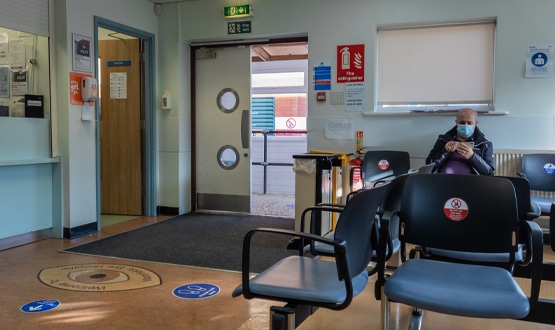Roundtable: How could Covid-driven digital change permanently improve health and social care in the UK?

Almost exactly a year after the first Covid cases were detected in the UK, Digital Health brought together a small panel of experts to consider the past 12 months of healthcare digitisation. In a virtual roundtable event run in association with Virgin Media Business, the group discussed the progress already made – and, crucially – where we ago from here. Claire Read reports.
When Pushpakaran Munuswamy thinks about the major digital changes that have taken place in his department during the pandemic, he thinks of calprotectin tests. Such tests are crucial to monitoring inflammatory bowel disease, enabling the detection of exacerbations before they become serious. And, since last summer, his patients have been able to carry them out remotely and share results via smartphone.
“Patients are given a little pregnancy test-style kit,” explains Munuswamy, consultant gastroenterologist Mid and South Essex NHS Foundation Trust and previously CCIO of one of the organisations which merged to form the organisation.
“They put the stool sample on it and use a smartphone to scan the result displayed. It gives a value immediately and all that is conveyed to the clinical team, and then we act on it.”
Speaking at a Digital Health virtual roundtable, Munuswamy reported the setup has reduced hospital admissions among this group by 40%. It’s just one of the multitude of examples of accelerated digital transformation that has taken place during the pandemic, and it was to review this progress that the roundtable was convened.
Held at the end of April, the event brought together a small panel of experts. The item on the agenda? To consider the past 12 months of healthcare digitisation and to discuss where we go from here.
Certainly the evidence suggests progress has been made. In 2019, just a quarter of respondents to Digital Health Intelligence’s annual NHS IT Leadership Survey said their organisation offered online video consultations with healthcare professionals. This year, the figure has jumped to 85%.
This chimes well with a report from the Centre for Economics and Business Research. Supported by Virgin Media Business, it suggests flexible working, digital delivery of services, and richer data for analytics and AI leads to a 12% productivity boost for the sector.
Russell Tilsed, senior director – public sector at phone system provider 8×8, told the roundtable panel his firm had seen a huge increase in demand from NHS organisations.
“We previously had a fairly small footprint in the NHS. But we’ve had 15 trusts come to us in the last 12 months for unified communications and contacts centres. That would previously have been unheard of.”
In part, that’s likely because obstacles to progress have crumbled in the face of a novel virus and unprecedented pressure. Ways of doing things which might previously have been seen as nice to have became the only option.
“I do think there was a lot of ability to break down barriers that were previously there and challenge people about their models of working,” argued Jeremy Drake, consultant anaesthetist and chief clinical information officer at Buckinghamshire Healthcare NHS Trust. “We’ve shown that remote consultations and working from home can work,”
It’s a scale of change that should not be underestimated, suggested Graham Walsh. And the chief clinical information officer at Calderdale and Huddersfield NHS Foundation Trust argued it wasn’t just clinicians whose attitudes had been changed. He felt patients had become more comfortable with digital too.
“I think we’ve seen much more acceptance that, actually, it’s okay to be seen remotely; it’s okay to have remote monitoring. I think, largely, patients have been really accepting of this virtual world and actually found it to be of great benefit.”
As a knee surgeon, Walsh has been using wearable technology to monitor how a patient gets on following a procedure. He did so even before the pandemic. But the pressures of Covid have turned this into standard practice.
Indeed in talking about the digital change seen during the pandemic, many panellists pointed out that – while it may have often been characterised as several years of progress in several months – the reality in many cases has been embracing what was already there as opposed to doing something entirely new.
“We’ve adopted what was there, quickly,” argued Adam Thomas, chief information officer at The Dudley Group NHS Foundation Trust. “We were already using some wearables, we were already using some virtualisation, we were already using some video conferencing -we just adopted things that were already there but we weren’t using them commonly.
“But that doesn’t mean we’ve fundamentally transformed yet, we’ve just set the tone of how we can transform,” he suggested.
In fact the need to optimise what is already in place was a common theme to emerge during the debate. Vincent Kelly, crown representative – IT and telecoms for the Cabinet Office, said he and colleagues had found there are often huge inefficiencies in IT. “It might be licenses, use of servers, over capacity in certain areas. [We should be] looking at the inefficiencies that we can drive out to help do other stuff.”
However the need to optimise what’s already in place sits among the danger that some barriers to improved digitisation which fell during the pandemic might yet be resurrected.
“For me what relaxed during Covid were some of the governance walls. We weren’t bound by red tape and walls; we were empowered to do stuff,” reported Mandy Griffin, chief information officer at Calderdale and Huddersfield NHS Foundation Trust and managing director of The Health Informatics Service (THIS), which is hosted by the trust.
“I think that could come back now, where people will start assessing: ‘Do we need to put that rule back in now?’ and those hurdles then become a barrier for the future.”
It’s a concern from a supplier viewpoint too, according to Martin McFadyen. “We saw significant changes in governance, not just in a customer environment, but also in our own organisation,” reported the head of public sector at Virgin Media Business. “So how can we work with customers to ensure that we achieve the best outcomes, without bringing too much of that red tape or bureaucracy back?”
Answering that question is part, our panel agreed, of sustaining some of the positive change during the pandemic. But members also agreed that in many ways the pace of change seen so far simply cannot be sustained – and there is a need to be open about that.
“There was a lot of adrenaline as we went into the pandemic and our backs were against the wall, and we had to come up with new ways of working,” pointed out Buckinghamshire’s Drake.
So what does this next phase look like? How can gains be consolidated at the same time as further progress made? For Shauna McMahon, chief information officer at Northern Lincolnshire and Goole NHS Foundation Trust, there is still work to do on the cultural shift around digital.
“As a system we need to be more comfortable with the level of change we need to do and could do,” she argued. “I can give a good example – there are some organisations in North America that actually go out and purchase tablets and set up the internet for vulnerable patient groups [to give them remote support which helps avoid unplanned hospital attendance].
“If we went to our boards and said: ‘Well I think we should buy X number of tablets, and pay for the internet for this cohort of vulnerable patients, because they’ve arrived at A&E 20 times this year and will be much more effective for them, better for us,’ it would be a really tough sell. So I think that cultural shift is one that is going to take us a bit more time.”
For some, there is optimism that the move to integrated care systems – now in place across the country, with a future statutory footing planned by the government – may make a difference here.
“The success of ICSs won’t be about healthcare on its own, it’ll be about working with local authorities and local government, and the third sector,” pointed out Dudley’s Thomas, who hopes some of the gains made during the pandemic will change conversations within such bodies.
“From April to April, we did just over 172,000 virtual outpatient appointments which, by our modelling, saved two million road miles. So we could start to say [to the local authority]: look at some of the offset here in road maintenance if we can sustain this.
“That then changes some of the case for digital inclusion, and the wider inequalities case. Our collaboration [at ICS level] needs to have a societal value and I think we as digital leaders could probably do better in articulating where the value comes from.”
In other words: the task ahead is quite simply to continue to push the digital agenda that has become so central in recent months. “I think that is our duty, to do that, that’s within our gift,” said Walsh. “I mean, who would’ve thought you could have a meeting like this, with all these people brought together in a virtual way? This is the reality now, we now communicate comfortably in this digital environment, and I think we need to embed that digital philosophy.”
Panel:
- Jeremy Drake, chief clinical information officer, Buckinghamshire Healthcare NHS Trust
- Mandy Griffin, managing director, The Health Informatics Service (THIS)
- Vincent Kelly, crown representative – IT and telecoms, Cabinet Office
- Martin McFadyen, head of public sector, Virgin Media Business
- Shauna McMahon, chief information officer, Northern Lincolnshire and Goole NHS Foundation Trust
- Pushpakaran Munuswamy, consultant gastroenterologist and former chief clinical information officer, Mid and South Essex NHS Foundation Trust
- Claire Read, contributing editor, Digital Health (roundtable chair)
- Adam Thomas, chief information officer, The Dudley Group NHS Foundation Trust
- Russell Tilsed, senior director – public sector, 8×8
- Graham Walsh, chief clinical information officer, Calderdale and Huddersfield NHS Foundation Trust




